by Lisa Cooke | Aug 24, 2012 |
Thank you for your purchase. We email digital ebook purchases to the email you provided at checkout within 24 hours. You will receive an email to confirm when your order has shipped.
Visit the Store for more great genealogy resources.
Sign up for the free Genealogy Gems Newsletter (in the right hand column) and receive the free 20 page ebook 5 Fabulous Google Search Strategies for the Family Historian!

by Lisa Cooke | May 11, 2015 | 01 What's New, DNA, images, Records & databases, Technology
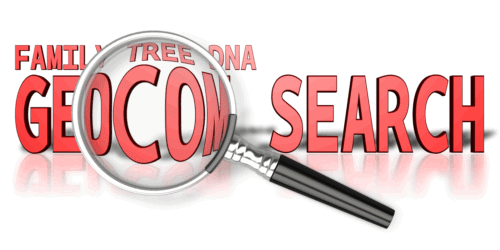 Family Tree DNA (FTDNA) has some of my very favorite genetic tools to help you make connections with your DNA matches when you can’t immediately find a genealogical connection, but it’s no secret that their genealogy tools leave much to be desired. However, their latest genealogy tool has promise: if certain conditions are met, you will be able to see whether any descendant of one of your ancestors has taken a DNA test!
Family Tree DNA (FTDNA) has some of my very favorite genetic tools to help you make connections with your DNA matches when you can’t immediately find a genealogical connection, but it’s no secret that their genealogy tools leave much to be desired. However, their latest genealogy tool has promise: if certain conditions are met, you will be able to see whether any descendant of one of your ancestors has taken a DNA test!
For quite some time now FTDNA has allowed you to enter your genealogical surnames and locations into your account and list your earliest known paternal and maternal line ancestors. The latter is displayed for your YDNA and mtDNA matches to see and the former for your autosomal DNA matches to see. As a bonus, if one of your autosomal matches shares an inputted surname, FTDNA will bold that surname (or location) for you in the “Ancestral Surnames” column of your match page.
A few months ago they upgraded their pedigree tool for uploading a GEDCOM into your account. This GEDCOM does not in any way interact with your DNA match list or results; it is just provided as a resource to your matches. The pedigree tool itself is clumsy at best, but at least it is searchable and can give you a head start when looking for matches. It would be really nice if FTDNA could scrape all the surnames and locations from your GEDCOM and use that to populate your Ancestral Surnames field, but it does not.
The latest addition to FTDNA’s mediocre genealogy offerings is the ability to search all of the uploaded pedigree information in the FTDNA database. The best part about this feature is that it is not limited to searching just your DNA matches. This means you can see if any descendant of one of your ancestors has taken a DNA test! This is great news!
Of course, you see the immediate problem: if the cousin of interest hasn’t uploaded a GEDCOM, you still won’t be able to find them. And, of course, the usefulness of the information is completely dependent on other people’s genealogical sleuthing skills. But still, this can be a useful tool.
I tried using this tool to find out if there were other descendants of my ancestors Julia Pond and Austin Tilton who had tested. I have one DNA match who descends from this couple and I am fairly certain this is our connection. I wanted to see if there were others out there who were also descendants of this couple. I started with just a search for “Julia Pond” and got 37 results. I then used the advanced search feature to add her birth year “1821” and “Ohio.”
There were two matches. My family tree, and another belonging to Katie. It was frustrating that I couldn’t see right away if Katie was also a DNA match. But in the Advanced search I can ask to see only DNA matches, and repeat the search. Katie disappeared. By doing this I learned that Katie is descendant of Julia and Austin, but she and I don’t share enough DNA to be considered related. This makes sense, since descendants of this couple would be my 4th cousins at best, and I know that I will only genetically match about half of my fourth cousins. I can now contact my DNA match that lists Julia and Austin on his pedigree and ask him if Katie shows up on his match list. Perhaps they share some DNA that I do not.
Speaking of that DNA match of mine: why wasn’t he listed in my search results for Julia Pond? Well, it turns out that in his pedigree she is listed as born in 1821 from OH, and my search said Ohio. Ah. The search function is not catching those kinds of differences. So be careful.
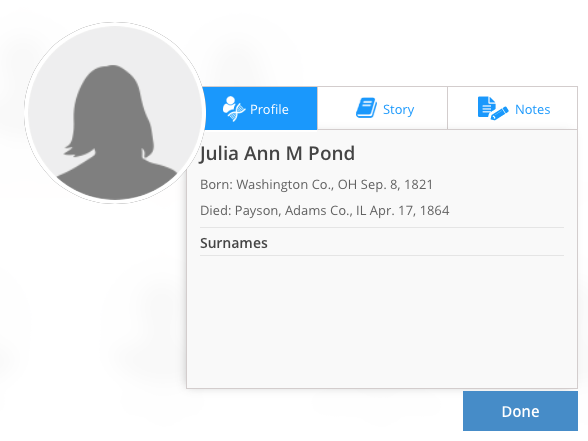
When implemented properly, this tool can help you collect all of the descendants of a particular ancestor so you can learn more about what DNA you inherited from whom, and further your genealogical efforts.
Are you ready to get started? If you’re new to genetic genealogy, the first thing to do is acknowledge you may face some unexpected discoveries. If you’re not willing to chance some surprises on your family tree, don’t pursue it yet. Next, evaluate FTDNA (or other DNA companies) for yourself. If you decide to get started, your first step should be to upload your own GEDCOM, and make it public. Don’t feel like you have to put everything you know in this GEDCOM, just what you are certain of and feel confident sharing. To make it public, go into your Account Settings, and agree to share your Basic Profile.
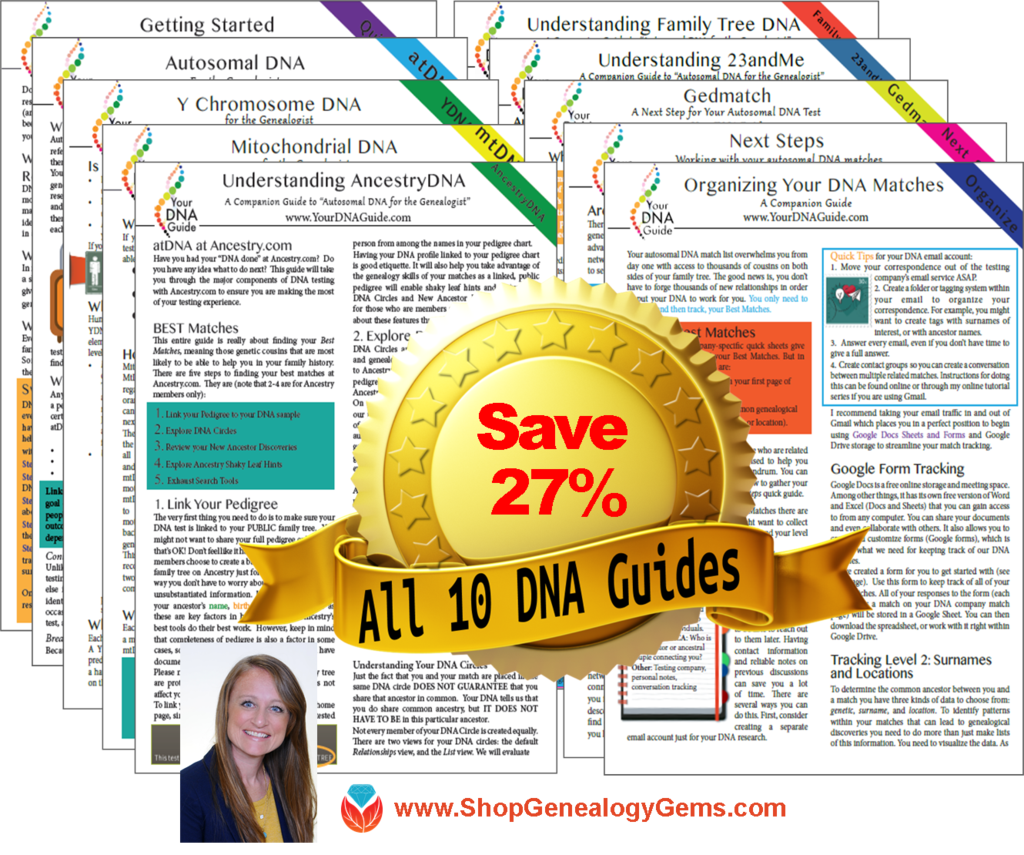 After this Family Tree DNA review, if you’re ready to explore what DNA can do for YOUR genealogy, why not explore how I can help you do it? My quick guides on genetic genealogy include a guide specifically for those who test at Family Tree DNA.
After this Family Tree DNA review, if you’re ready to explore what DNA can do for YOUR genealogy, why not explore how I can help you do it? My quick guides on genetic genealogy include a guide specifically for those who test at Family Tree DNA.
You can also hire me for an individual consultation to make sure you’re doing the right DNA tests with the right relatives to answer your burning genealogy questions. (Testing the wrong people or DNA type can be a very expensive mistake!)
by Lisa Cooke | Mar 6, 2015 | Australian, British, Findmypast, images, Irish, Newspaper, Records & databases
 Beginning today, try FindMyPast for FREE –all weekend long!
Beginning today, try FindMyPast for FREE –all weekend long!
Over 2 billion historical records will be available to search beginning Friday, March 6 and ending Monday, March 9 (start and finish at midday London time (GMT)). Local subscribers will have World access during this time and World subscribers get an extra three days tacked onto their subscriptions.
What kinds of records are we talking about? According to FindMyPast:
- “Over 900 million census records from across the UK, USA and Ireland;
- Passenger lists for ships sailing to and from Europe, Australia, New Zealand, and the USA;
- Birth, marriage and death records dating back to the 18th century, and the largest online collection of UK parish records;
- The most comprehensive collection of UK military records anywhere online;
- The largest collection of Irish family history records available online;
- Historical newspapers from across the world, including more than 10 million British newspaper pages from as long ago as 1710;
- An easy to use online family tree builder which allows you to import and export your tree if you’ve built it elsewhere;
- Our automatic Hints feature, which automatically searches our records for you and suggests potential matches to the people you add to your family tree.”
You may also find these resources helpful:
Webinar on Finding Female Ancestors. To celebrate International Women’s Day, at 7am EST on Sunday 8th March, Findmypast will host a webinar on searching for women in historical records. Women are usually tougher to find than men in old records because a) they were mentioned much less frequently and b) their names changed with their marital status.
Getting Started Video. Findmypast has created a new Getting Started video which will be available to view beginning this weekend.
Find out more at Findmypast’s dedicated Free Weekend page.
by Diahan Southard | Mar 20, 2015 | 01 What's New, Digital Archives, Oral History, Records & databases
We learn about great new genealogy records online every week! On Fridays we round up a few for you. Watch for databases and documents that your ancestors might appear in–and get inspired by the types of records that may be out there for your family, waiting for you to discover. This week: Michigan death certificates; Zimbabwe death notices, wills and trusts and an oral history archive of New Zealand nursing.

MICHIGAN DEATHS. Images of Michigan death certificates from 1921-1939 are now available for free at Seeking Michigan. “The index for records from 1940-1952 will be made available in the next few weeks, with additional certificate images to be released each year as privacy restrictions are lifted (1940 images will be released in January 2016),” says a press release.
“Together with the records from 1897-1920 that have been available at the site for years, this collection makes Seeking Michigan the one-stop destination for more than 2.6 million free, publicly-available 20th century death records for Michigan ancestors.”
ZIMBABWE DEATH NOTICES. Over 130,000 indexed and browsable records from the Zimbabwe, Death notices, 1904–1976 are now available on FamilySearch. According to the description, “The records included in this collection consist of death notices and registers obtained from the National Archives at Harare and Salisbury, Zimbabwe. The collection includes indexes of closed and open files. The records are written in English. It appears those records that are labeled ADM are probably administrations which are separate from the death registers and they contain wills and living Trust records. Birth and death registrations did not include African tribal members until 1963.”
NEW ZEALAND ORAL HISTORIES. A new web archive of oral histories of New Zealand nurses is now available. “The aim of this website is to capture this rich history and create a resource that nurses, students, academics and family members can access in order to gain a better understanding of nursing history in New Zealand,” says the site’s home page. The site contains a “large collection of oral histories including abstracts, recordings, photos and other information. These histories have been collected from nurses who trained during the 1950s and 1960s and capture both the everyday elements of nursing practice along with some of the more unusual. Here you are able to listen to stories, read brief abstracts, and view photos of the nurses.” Got a story to tell? They are accepting new interviews. There’s also a section on hospitals and one on nursing uniforms.
 Not sure how to find record sets like these for YOUR family history? Here’s a tip! If your keyword searches for record types aren’t bringing up good results, try switching the order of the search terms. In English-language searches, word order counts.
Not sure how to find record sets like these for YOUR family history? Here’s a tip! If your keyword searches for record types aren’t bringing up good results, try switching the order of the search terms. In English-language searches, word order counts.
This tip comes to you courtesy of the book The Genealogist’s Google Toolbox, Second Edition by Lisa Louise Cooke–the fully-revised 2015 edition that’s packed with strategies that will dramatically improve your ability to find your family history online.
by Lisa Cooke | Mar 12, 2015 | 01 What's New, Health History, Inspiration, Writing Family History
Did you know that writing–and then re-writing–our personal stories can be good for our health? And even better for our future,
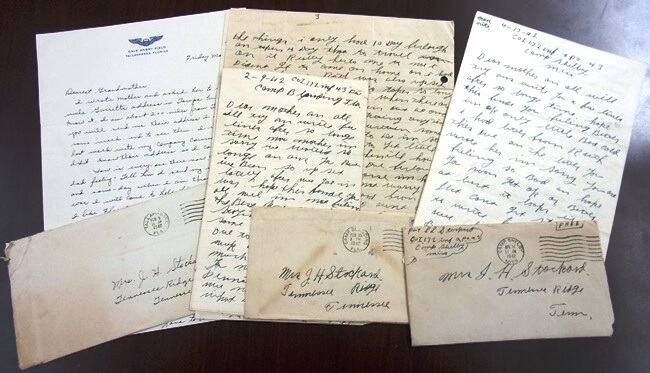
Courtesy Houston County, TN. Archives.especially if we are struggling to define that future optimistically.
So says a recent New York Times blog post. “We all have a personal narrative that shapes our view of the world and ourselves,” writes Tara Parker-Pope.
“But sometimes our inner voice doesn’t get it completely right. Some researchers believe that by writing and then editing our own stories, we can change our perceptions of ourselves and identify obstacles that stand in the way of better health.”
She’s not talking about writing childhood memories or ancestral anecdotes. In several studies, people who were struggling in an area were asked to write about it. Then they were presented with optimistic scenarios about how others had overcome difficulties. Those who rewrote their narratives were able to grab onto some of that optimism. They actually changed the way they thought of their “problem,” whatever it was. And long-term results in some studies showed that these people DID in fact improve.
We often see celebrities on Who Do You Think You Are? talk about how their ancestors’ lives inspire them or teach them new ways of understanding their own lives. Many who write their own family histories say the same thing. As we wrestle with memories or facts and how to present them in writing, we also interpret the past in new ways and, often, this new insight brings hope for a better future.
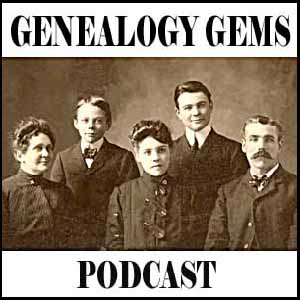 One more GREAT reason to write your life story and family history, don’t you think? Thanks to my brother Chris McClellan for sharing this blog post with me.
One more GREAT reason to write your life story and family history, don’t you think? Thanks to my brother Chris McClellan for sharing this blog post with me.
Listen as Lisa and I discuss different styles for writing about your family history in the FREE Genealogy Gems podcast episode 176. Or get inspired by the family history-themed books we love and share on our Genealogy Gems Book Club page. Click here for great suggestions on what to read!










